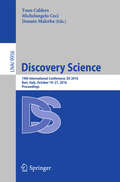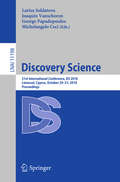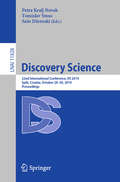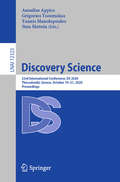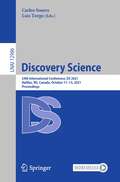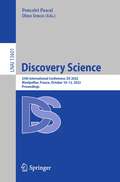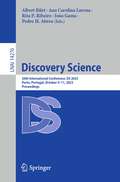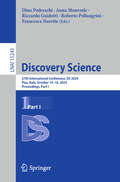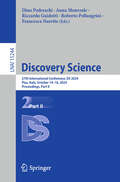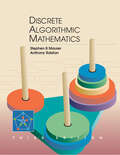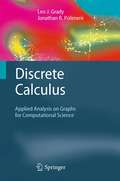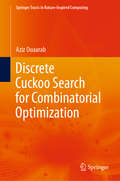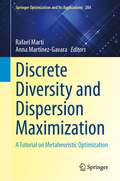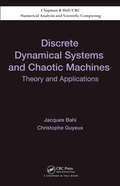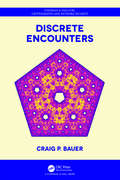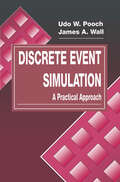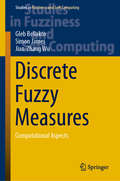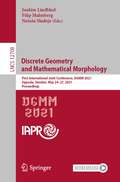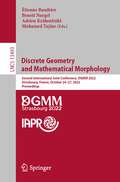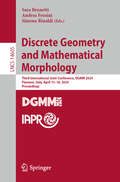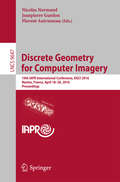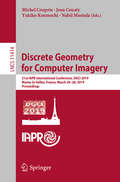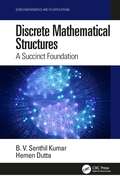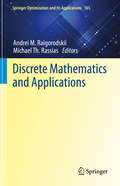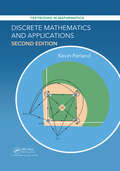- Table View
- List View
Discovery Science: 19th International Conference, DS 2016, Bari, Italy, October 19–21, 2016, Proceedings (Lecture Notes in Computer Science #9956)
by Toon Calders, Michelangelo Ceci and Donato MalerbaThis book constitutes the proceedings of the 17th International Conference on Discovery Science, DS 2016, held in banff, AB, Canada in October 2015. The 30 full papers presented together with 5 abstracts of invited talks in this volume were carefully reviewed and selected from 60 submissions.The conference focuses on following topics: Advances in the development and analysis of methods for discovering scientific knowledge, coming from machine learning, data mining, and intelligent data analysis, as well as their application in various scientific domains.
Discovery Science: 21st International Conference, DS 2018, Limassol, Cyprus, October 29–31, 2018, Proceedings (Lecture Notes in Computer Science #11198)
by Michelangelo Ceci Joaquin Vanschoren Larisa Soldatova George PapadopoulosThis book constitutes the proceedings of the 21st International Conference on Discovery Science, DS 2018, held in Limassol, Cyprus, in October 2018, co-located with the International Symposium on Methodologies for Intelligent Systems, ISMIS 2018. The 30 full papers presented together with 5 abstracts of invited talks in this volume were carefully reviewed and selected from 71 submissions. The scope of the conference includes the development and analysis of methods for discovering scientific knowledge, coming from machine learning, data mining, intelligent data analysis, big data analysis as well as their application in various scientific domains. The papers are organized in the following topical sections: Classification; meta-learning; reinforcement learning; streams and time series; subgroup and subgraph discovery; text mining; and applications.
Discovery Science: 22nd International Conference, DS 2019, Split, Croatia, October 28–30, 2019, Proceedings (Lecture Notes in Computer Science #11828)
by Sašo Džeroski Petra Kralj Novak Tomislav ŠmucThis book constitutes the proceedings of the 22nd International Conference on Discovery Science, DS 2019, held in Split, Coratia, in October 2019. The 21 full and 19 short papers presented together with 3 abstracts of invited talks in this volume were carefully reviewed and selected from 63 submissions. The scope of the conference includes the development and analysis of methods for discovering scientific knowledge, coming from machine learning, data mining, intelligent data analysis, big data analysis as well as their application in various scientific domains. The papers are organized in the following topical sections: Advanced Machine Learning; Applications; Data and Knowledge Representation; Feature Importance; Interpretable Machine Learning; Networks; Pattern Discovery; and Time Series.
Discovery Science: 23rd International Conference, DS 2020, Thessaloniki, Greece, October 19–21, 2020, Proceedings (Lecture Notes in Computer Science #12323)
by Yannis Manolopoulos Annalisa Appice Stan Matwin Grigorios TsoumakasThis book constitutes the proceedings of the 23rd International Conference on Discovery Science, DS 2020, which took place during October 19-21, 2020. The conference was planned to take place in Thessaloniki, Greece, but had to change to an online format due to the COVID-19 pandemic. The 26 full and 19 short papers presented in this volume were carefully reviewed and selected from 76 submissions. The contributions were organized in topical sections named: classification; clustering; data and knowledge representation; data streams; distributed processing; ensembles; explainable and interpretable machine learning; graph and network mining; multi-target models; neural networks and deep learning; and spatial, temporal and spatiotemporal data.
Discovery Science: 24th International Conference, DS 2021, Halifax, NS, Canada, October 11–13, 2021, Proceedings (Lecture Notes in Computer Science #12986)
by Carlos Soares Luis TorgoThis book constitutes the proceedings of the 24th International Conference on Discovery Science, DS 2021, which took place virtually during October 11-13, 2021.The 36 papers presented in this volume were carefully reviewed and selected from 76 submissions. The contributions were organized in topical sections named: applications; classification; data streams; graph and network mining; machine learning for COVID-19; neural networks and deep learning; preferences and recommender systems; representation learning and feature selection; responsible artificial intelligence; and spatial, temporal and spatiotemporal data.
Discovery Science: 25th International Conference, DS 2022, Montpellier, France, October 10–12, 2022, Proceedings (Lecture Notes in Computer Science #13601)
by Poncelet Pascal Dino IencoThis book constitutes the proceedings of the 25th International Conference on Discovery Science, DS 2022, which took place virtually during October 10-12, 2022. The 27 full papers and 12 short papers presented in this volume were carefully reviewed and selected from 59 submissions.
Discovery Science: 26th International Conference, DS 2023, Porto, Portugal, October 9–11, 2023, Proceedings (Lecture Notes in Computer Science #14276)
by João Gama Albert Bifet Rita P. Ribeiro Ana Carolina Lorena Pedro H. AbreuThis book constitutes the proceedings of the 26th International Conference on Discovery Science, DS 2023, which took place in Porto, Portugal, in October 2023. The 37 full papers and 10 short papers presented in this volume were carefully reviewed and selected from 133 submissions. They were organized in topical sections as follows: Machine learning methods and applications; natural language processing and social media analysis; interpretability and explainability in AI; data analysis and optimization; fairness, privacy and security in AI; control and spatio-temporal modeling; graph theory and network analysis; time series and forecasting; healthcare and biological data analysis; anomaly, outlier and novelty detection.
Discovery Science: 27th International Conference, DS 2024, Pisa, Italy, October 14–16, 2024, Proceedings, Part I (Lecture Notes in Computer Science #15243)
by Dino Pedreschi Riccardo Guidotti Anna Monreale Roberto Pellungrini Francesca NarettoThe two-volume set LNAI 15243 + 15244 constitutes the proceedings of the 27th International Conference on Discovery Science, DS 2024, which took place in Pisa, Italy, during October 14-16, 2024. The 53 full papers presented in the proceedings were carefully reviewed and selected from 121 submissions. They were organized in topical sections as follows: Part I: LLM, Text Analytics, and Ethical Aspects of AI; Natural Language Processing, Sequential Data and Science Discovery; Data-Driven Science Discovery Methodologies; Graph Neural Network, Graph Theory, Unsupervised Learning and Regression; Part II: Tree-Based Models and Causal Discovery; Security and Anomaly Detection; Computer Vision and Explainable AI; Classification Models; SoBigData++: City for Citizens and Explainable AI; SoBigData++: Societal Debates and Misinformation Analysis.
Discovery Science: 27th International Conference, DS 2024, Pisa, Italy, October 14–16, 2024, Proceedings, Part II (Lecture Notes in Computer Science #15244)
by Dino Pedreschi Riccardo Guidotti Anna Monreale Roberto Pellungrini Francesca NarettoThe two-volume set LNAI 15243 + 15244 constitutes the proceedings of the 27th International Conference on Discovery Science, DS 2024, which took place in Pisa, Italy, during October 14-16, 2024. The 53 full papers presented in the proceedings were carefully reviewed and selected from 121 submissions. They were organized in topical sections as follows: Part I: LLM, Text Analytics, and Ethical Aspects of AI; Natural Language Processing, Sequential Data and Science Discovery; Data-Driven Science Discovery Methodologies; Graph Neural Network, Graph Theory, Unsupervised Learning and Regression; Part II: Tree-Based Models and Causal Discovery; Security and Anomaly Detection; Computer Vision and Explainable AI; Classification Models; SoBigData++: City for Citizens and Explainable AI; SoBigData++: Societal Debates and Misinformation Analysis.
Discrete Algorithmic Mathematics
by Anthony Ralston Stephen B. MaurerThoroughly revised for a one-semester course, this well-known and highly regarded book is an outstanding text for undergraduate discrete mathematics. It has been updated with new or extended discussions of order notation, generating functions, chaos, aspects of statistics, and computational biology. Written in a lively, clear style, the book is unique in its emphasis on algorithmics and the inductive and recursive paradigms as central mathematical themes. It includes a broad variety of applications, not just to mathematics and computer science, but to natural and social science as well.
Discrete Calculus
by Leo J. Grady Jonathan R. PolimeniThe field of discrete calculus, also known as "discrete exterior calculus", focuses on finding a proper set of definitions and differential operators that make it possible to operate the machinery of multivariate calculus on a finite, discrete space. In contrast to traditional goals of finding an accurate discretization of conventional multivariate calculus, discrete calculus establishes a separate, equivalent calculus that operates purely in the discrete space without any reference to an underlying continuous process. This unique text brings together into a single framework current research in the three areas of discrete calculus, complex networks, and algorithmic content extraction. Although there have been a few intersections in the literature between these disciplines, they have developed largely independently of one another, yet researchers working in any one of these three areas can strongly benefit from the tools and techniques being used in the others. Many example applications from several fields of computational science are provided to demonstrate the usefulness of this framework to a broad range of problems. Readers are assumed to be familiar with the basics of vector calculus, graph theory, and linear algebra. Topics and features: presents a thorough review of discrete calculus, with a focus on key concepts required for successful application; unifies many standard image processing algorithms into a common framework for viewing a wide variety of standard algorithms in filtering, clustering, and manifold learning that may be applied to processing data associated with a graph or network; explains how discrete calculus provides a natural definition of "low-frequency" on a graph, which then yields filtering and denoising algorithms; discusses how filtering algorithms can give rise to clustering algorithms, which can be used to develop manifold learning and data discovery methods; examines ranking algorithms, as well as algorithms for analyzing the structure of a network. Graduate students and researchers interested in discrete calculus, complex networks, image processing and computer graphics will find this text/reference a clear introduction to the foundations of discrete calculus as well as a useful guide to have readily available for their work. Dr. Leo J. Grady is a Senior Research Scientist with Siemens Corporate Research in Princeton, New Jersey, USA. Dr. Jonathan R. Polimeni is a Research Fellow at the Massachusetts General Hospital in Boston, Massachusetts, USA, and Instructor in Radiology at Harvard Medical School, Boston, Massachusetts, USA.
Discrete Cuckoo Search for Combinatorial Optimization (Springer Tracts in Nature-Inspired Computing)
by Aziz OuaarabThis book provides a literature review of techniques used to pass from continuous to combinatorial space, before discussing a detailed example with individual steps of how cuckoo search (CS) can be adapted to solve combinatorial optimization problems. It demonstrates the application of CS to three different problems and describes their source code. The content is divided into five chapters, the first of which provides a technical description, together with examples of combinatorial search spaces. The second chapter summarizes a diverse range of methods used to solve combinatorial optimization problems. In turn, the third chapter presents a description of CS, its formulation and characteristics. In the fourth chapter, the application of discrete cuckoo search (DCS) to solve three POCs (the traveling salesman problem, quadratic assignment problem and job shop scheduling problem) is explained, focusing mainly on a reinterpretation of the terminology used in CS and its source of inspiration. In closing, the fifth chapter discusses random-key cuckoo search (RKCS) using random keys to represent positions found by cuckoo search in the TSP and QAP solution space.
Discrete Diversity and Dispersion Maximization: A Tutorial on Metaheuristic Optimization (Springer Optimization and Its Applications #204)
by Rafael Martí Anna Martínez-GavaraThis book demonstrates the metaheuristic methodologies that apply to maximum diversity problems to solve them. Maximum diversity problems arise in many practical settings from facility location to social network analysis and constitute an important class of NP-hard problems in combinatorial optimization. In fact, this volume presents a “missing link” in the combinatorial optimization-related literature. In providing the basic principles and fundamental ideas of the most successful methodologies for discrete optimization, this book allows readers to create their own applications for other discrete optimization problems. Additionally, the book is designed to be useful and accessible to researchers and practitioners in management science, industrial engineering, economics, and computer science, while also extending value to non-experts in combinatorial optimization. Owed to the tutorials presented in each chapter, this book may be used in a master course, a doctoral seminar, or as supplementary to a primary text in upper undergraduate courses.The chapters are divided into three main sections. The first section describes a metaheuristic methodology in a tutorial style, offering generic descriptions that, when applied, create an implementation of the methodology for any optimization problem. The second section presents the customization of the methodology to a given diversity problem, showing how to go from theory to application in creating a heuristic. The final part of the chapters is devoted to experimentation, describing the results obtained with the heuristic when solving the diversity problem. Experiments in the book target the so-called MDPLIB set of instances as a benchmark to evaluate the performance of the methods.
Discrete Dynamical Systems and Chaotic Machines: Theory and Applications (Chapman & Hall/CRC Numerical Analysis and Scientific Computing Series #20)
by Christophe Guyeux Jacques BahiUntil the authors' recent research, the practical implementation of the mathematical theory of chaos on finite machines raised several issues. This self-contained book shows how to make finite machines, such as computers, neural networks, and wireless sensor networks, work chaotically as defined in a rigorous mathematical framework. Taking into account that these machines must interact in the real world, the authors share their research results on the behaviors of discrete dynamical systems and their use in computer science.
Discrete Encounters (Chapman & Hall/CRC Cryptography and Network Security Series)
by Craig BauerEschewing the standard dry and static writing style of traditional textbooks, Discrete Explorations provides a refreshing approach to discrete mathematics. The author combines traditional course topics with popular culture, applications, and various historical examples. This book focuses on the historical development of the subject and provides details on the people behind mathematics and their motivations, which will deepen readers’ appreciation of mathematics. With its unique style, the book covers many of the same topics found in other texts but done in an alternative, entertaining style that better captures readers’ attention. Defining discrete mathematics, the author also covers many different topics. These include combinatorics, fractals, permutations, difference equations, graph theory, trees and financial mathematics. Not only will readers gain a greater impression of mathematics, but they’ll be encouraged to further explore the subject. Highlights: Features fascinating historical references to motivate readers Text includes numerous pop culture references throughout to provide a more engaging reading experience Its unique topic structure presents a fresh approach The text’s narrative style reads more like a popular book instead of a dry textbook Covers many topics from combinatorics, as well as discrete mathematics
Discrete Event Simulation: A Practical Approach (Computer Science & Engineering)
by Udo W. Pooch James A. WallDiscrete Event Simulation is a process-oriented text/reference that utilizes an eleven-step model to represent the simulation process from problem formulation to implementation and documentation. The book presents the necessary level of detail required to fully develop a model that produces meaningful results and considers the tools necessary to interpret those results. Sufficient background information is provided so that the underlying concepts of simulation are understood.Major topics covered in Discrete Event Simulation include probability and distributional theory, statistical estimation and inference, the generation of random variates, verification and validation techniques, time management methods, experimental design, and programming language considerations. The book also examines distributed simulation and issues related to distributing the physical process over a network of tightly coupled processors. Topics covered in this area include deadlock, synchronization, rollback, event management, and communication processes.Fully worked examples and numerous practical exercises have been drawn from the engineering disciplines and computer science, although they have been structured so that they will be useful as well to other disciplines such as economics, business administration, and management science. The presentation of techniques and methods in Discrete Event Simulation make it an ideal text/reference for all practitioners of discrete event simulation.
Discrete Fuzzy Measures: Computational Aspects (Studies in Fuzziness and Soft Computing #382)
by Simon James Gleb Beliakov Jian-Zhang WuThis book addresses computer scientists, IT specialists, mathematicians, knowledge engineers and programmers, who are engaged in research and practice of multicriteria decision making. Fuzzy measures, also known as capacities, allow one to combine degrees of preferences, support or fuzzy memberships into one representative value, taking into account interactions between the inputs. The notions of mutual reinforcement or redundancy are modeled explicitly through coefficients of fuzzy measures, and fuzzy integrals, such as the Choquet and Sugeno integrals combine the inputs. Building on previous monographs published by the authors and dealing with different aspects of aggregation, this book especially focuses on the Choquet and Sugeno integrals. It presents a number of new findings concerning computation of fuzzy measures, learning them from data and modeling interactions. The book does not require substantial mathematical background, as all the relevant notions are explained. It is intended as concise, timely and self-contained guide to the use of fuzzy measures in the field of multicriteria decision making.
Discrete Geometry and Mathematical Morphology: First International Joint Conference, DGMM 2021, Uppsala, Sweden, May 24–27, 2021, Proceedings (Lecture Notes in Computer Science #12708)
by Filip Malmberg Nataša Sladoje Joakim LindbladThis book constitutes the proceedings of the First IAPR International Conference on Discrete Geometry and Mathematical Morphology, DGMM 2021, which was held during May 24-27, 2021, in Uppsala, Sweden.The conference was created by joining the International Conference on Discrete Geometry for computer Imagery, DGCI, with the International Symposium on Mathematical Morphology, ISMM. The 36 papers included in this volume were carefully reviewed and selected from 59 submissions. They were organized in topical sections as follows: applications in image processing, computer vision, and pattern recognition; discrete and combinatorial topology; discrete geometry - models, transforms, visualization; discrete tomography and inverse problems; hierarchical and graph-based models, analysis and segmentation; learning-based approaches to mathematical morphology; multivariate and PDE-based mathematical morphology, morphological filtering. The book also contains 3 invited keynote papers.
Discrete Geometry and Mathematical Morphology: Second International Joint Conference, DGMM 2022, Strasbourg, France, October 24–27, 2022, Proceedings (Lecture Notes in Computer Science #13493)
by Benoît Naegel Adrien Krähenbühl Étienne Baudrier Mohamed TajineThis book constitutes the proceedings of the Second IAPR International Conference on Discrete Geometry and Mathematical Morphology, DGMM 2022, which was held during October 24-27, 2022, in Strasbourg, France.The 33 papers included in this volume were carefully reviewed and selected from 45 submissions. They were organized in topical sections as follows: discrete and combinatorial topology; discrete tomography and inverse problems; multivariate and PDE-based mathematical morphology, morphological filtering; hierarchical and Graph-Based Models, Analysis and Segmentation; discrete geometry - models, transforms, and visualization; learning based morphology to Mathematical Morphology; and distance transform. The book also contains 3 invited keynote papers.
Discrete Geometry and Mathematical Morphology: Third International Joint Conference, DGMM 2024, Florence, Italy, April 15–18, 2024, Proceedings (Lecture Notes in Computer Science #14605)
by Andrea Frosini Simone Rinaldi Sara BrunettiThis book constitutes the refereed proceedings of the Third International Joint Conference on Discrete Geometry and Mathematical Morphology, DGMM 2024, held in Florence, Italy during April 15–18, 2024. The 34 full papers included in this book were carefully reviewed and selected from 51 submissions. They were organized in topical sections as follows: Digital Geometry - Models, Transforms, and Visualization; Computational Aspects of Discrete Structures and Tilings; Learning Based Morphology; Hierarchical and Graph-Based Models, Analysis and Segmentation; Discrete and Combinatorial Topology; and Mathematical Morphology and Digital Geometry for Applications.
Discrete Geometry for Computer Imagery
by Nicolas Normand Jeanpierre Guédon Florent AutrusseauThisbook constitutes the refereed proceedings of the 19th IAPR InternationalConference on Discrete Geometry for Computer Imagery, DGCI 2016, held in Nantes,France, in April 2016. The 32 revised full papers presented together with 2invited talks were carefully selected from 51 submissions. The papers areorganized in topical sections on combinatorial tools; discretization; discretetomography; discrete and combinatorial topology; shape descriptors; models fordiscrete geometry; circle drawing; morphological analysis; geometrictransforms; and discrete shape representation, recognition and analysis.
Discrete Geometry for Computer Imagery: 21st IAPR International Conference, DGCI 2019, Marne-la-Vallée, France, March 26–28, 2019, Proceedings (Lecture Notes in Computer Science #11414)
by Michel Couprie Jean Cousty Yukiko Kenmochi Nabil MustafaThis book constitutes the thoroughly refereed proceedings of the 21st IAPR International Conference on Discrete Geometry for Computer Imagery, DGCI 2019, held in Marne-la-Vallée, France, in March 2019. The 38 full papers were carefully selected from 50 submissions. The papers are organized in topical sections on discrete geometric models and transforms; discrete topology; graph-based models, analysis and segmentation; mathematical morphology; shape representation, recognition and analysis; and geometric computation.
Discrete Mathematical Structures: A Succinct Foundation (Mathematics and its Applications)
by Hemen Dutta B. V. KumarThis book contains fundamental concepts on discrete mathematical structures in an easy to understand style so that the reader can grasp the contents and explanation easily. The concepts of discrete mathematical structures have application to computer science, engineering and information technology including in coding techniques, switching circuits, pointers and linked allocation, error corrections, as well as in data networking, Chemistry, Biology and many other scientific areas. The book is for undergraduate and graduate levels learners and educators associated with various courses and progammes in Mathematics, Computer Science, Engineering and Information Technology. The book should serve as a text and reference guide to many undergraduate and graduate programmes offered by many institutions including colleges and universities. Readers will find solved examples and end of chapter exercises to enhance reader comprehension. Features Offers comprehensive coverage of basic ideas of Logic, Mathematical Induction, Graph Theory, Algebraic Structures and Lattices and Boolean Algebra Provides end of chapter solved examples and practice problems Delivers materials on valid arguments and rules of inference with illustrations Focuses on algebraic structures to enable the reader to work with discrete structures
Discrete Mathematics and Applications (Springer Optimization and Its Applications #165)
by Michael Th. Rassias Andrei M. RaigorodskiiAdvances in discrete mathematics are presented in this book with applications in theoretical mathematics and interdisciplinary research. Each chapter presents new methods and techniques by leading experts. Unifying interdisciplinary applications, problems, and approaches of discrete mathematics, this book connects topics in graph theory, combinatorics, number theory, cryptography, dynamical systems, finance, optimization, and game theory. Graduate students and researchers in optimization, mathematics, computer science, economics, and physics will find the wide range of interdisciplinary topics, methods, and applications covered in this book engaging and useful.
Discrete Mathematics and Applications, Second Edition (Textbooks in Mathematics)
by Kevin FerlandThis book is intended for a one-semester course in discrete mathematics. Such a course is typically taken by mathematics, mathematics education, and computer science majors, usually in their sophomore year. Calculus is not a prerequisite to use this book. Part one focuses on how to write proofs, then moves on to topics in number theory, employing set theory in the process. Part two focuses on computations, combinatorics, graph theory, trees, and algorithms.
